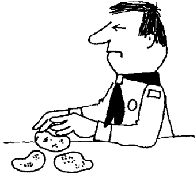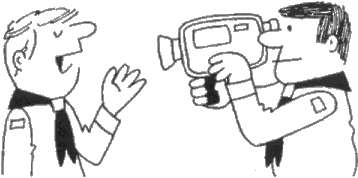This
game is unusual, good fun and helps everyone realise that all living
things are different and unique and that this applies to human beings
too.
Every
member of the Unit needs to have a potato. Get to know your potato
and describe it to the other members of the Unit for instance size,
shape, dimples and so on.
Put
your potato back into the middle of the circle and mix them up. Close
your eyes and search for your potato. As well as helping you with
observation and description, this activity can be used as a starter
to discuss everyone's individuality
As
we are all unique, we all have different skills and strengths. A typical
group of people consists of five or six individuals and is characterised
by its strengths, skills and individual personalities. It is amongst
our families and friends that we can test out our skills and learn
of our strengths.
This
activity also shows that despite all the differences of each potato,
it is only when several are cooked together
Ask
each Patrol to use their imagination and think of a means of communicating
the skills and strengths within the Patrol. This could be a radio
broadcast, a short video film, a poster or a mime. It is important
that the Patrol Leaders make sure that everyone is included.
Scouting
is a family with over 16 million Members world wide. In Scouting we
all make our Promise and do our very best to live up to our Promise.
It is important for Scouts to realise that Scouting crosses many of
the barriers that divide people; age, social class, colour, culture,
religion and nationality. When undertaking the activities on Scouting
in Uganda it would be helpful to emphasise the similarities rather
than dwell on the differences.




